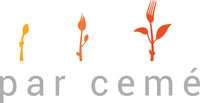
De la même famille que l’ail et l’oignon, le poireau nous vient lui aussi de l’Orient. Cultivé depuis des temps anciens, il a connu splendeur et décadence... Symbole de victoire, le pharaon Khéops en offrait à ses meilleurs guerriers. Le tristement célèbre empereur Néron, dit le « porrophage » (mangeur de poireaux), appréciait tellement ce légume qu’il en consommait tous les jours. La raison principale étant que le poireau est reconnu pour calmer la toux et adoucir la voix. On dit que Néron regarda Rome brûler tout en chantant et en jouant de la lyre. Les Romains l’introduisirent en Grande-Bretagne.
D’ailleurs, les Gallois prirent le poireau comme emblème national suite à une fameuse victoire. Pour se reconnaître, les soldats gallois avaient mis des poireaux à leurs chapeaux. Cependant en Europe il fut longtemps considéré comme l’asperge des pauvres. Ce n’est qu’au XXe qu’il sera réhabilité. Par Cemé lui donne une place d’honneur en vous le proposant dans une riche soupe aux poireaux et à l’orge, qui vous procurera réconfort, et qui sait adoucira votre voix.
From the same family as garlic and onion, leek also comes from the East. Cultivated since ancient times, it enjoyed splendor and decadence ... A symbol of victory, the pharaoh Khufu in offered its best warriors. The infamous emperor Nero, said the "porrophage" (leek-eater), appreciated that this vegetable to the point that he ate it daily. The main reason being that the leek is known to soothe coughs and soften the voice. It is said that Nero watched Rome burn while singing and playing the lyre. The Romans introduced it in Britain.
Besides, the Welsh took the leek as a national emblem after a famous victory. To recognize Welsh soldiers had put the leeks in their hats. But in Europe he was long regarded as the asparagus of the poor. It was not until the twentieth he will be rehabilitated. Par Cemé gives it a place of honor in offering you a rich leek and barley soup, which will give you comfort, and who knows…soften your voice.

